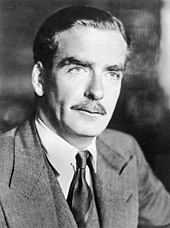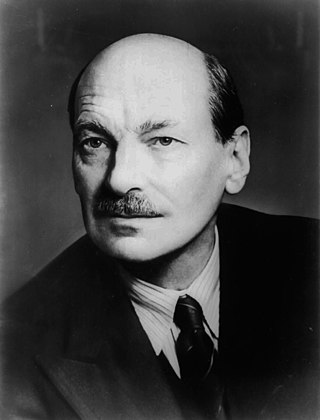
Clement Richard Attlee, 1st Earl Attlee, was a British statesman and Labour Party politician who served as Prime Minister of the United Kingdom from 1945 to 1951 and Leader of the Labour Party from 1935 to 1955. Attlee served as Deputy Prime Minister during the wartime coalition government under Winston Churchill, and Leader of the Opposition twice from 1935 to 1940 and from 1951 to 1955. He remains the longest serving Labour leader.
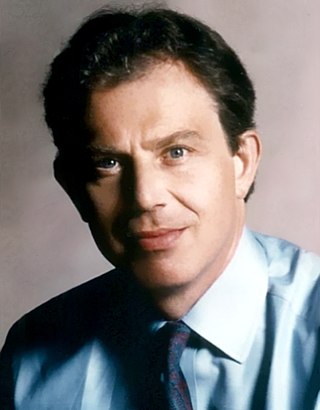
The 1997 United Kingdom general election was held on Thursday, 1 May 1997. The governing Conservative Party led by Prime Minister John Major was defeated in a landslide by the Labour Party led by Tony Blair, achieving a 179-seat majority.

Aneurin "Nye" Bevan PC was a Welsh Labour Party politician, noted for tenure as Minister of Health in Clement Attlee's government in which he spearheaded the creation of the British National Health Service. He is also known for his wider contribution to the founding of the British welfare state. He was first elected as MP for Ebbw Vale in 1929, and used his Parliamentary platform to make a number of influential criticisms of Winston Churchill and his government during the Second World War. Before entering Parliament, Bevan was involved in miners' union politics and was a leading figure in the 1926 general strike. Bevan is widely regarded as one of the most influential left-wing politicians in British history.

The deputy prime minister of the United Kingdom is the second highest ranking minister of the Crown and a member of the British Cabinet. The title is not always in use and prime ministers have been known to appoint informal deputies without the title of deputy prime minister. The incumbent deputy prime minister is Oliver Dowden who also serves as Chancellor of the Duchy of Lancaster and Secretary of State in the Cabinet Office.

The 1945 United Kingdom general election was a national election held on Thursday 5 July 1945, but polling in some constituencies was delayed by some days, and the counting of votes was delayed until 26 July to provide time for overseas votes to be brought to Britain. The governing Conservative Party sought to maintain its position in Parliament but faced challenges from public opinion about the future of the United Kingdom in the post-war period. Prime Minister Winston Churchill proposed to call for a general election in Parliament, which passed with a majority vote less than two months after the conclusion of the Second World War in Europe.

The 1951 United Kingdom general election was held twenty months after the 1950 general election, which the Labour Party had won with a slim majority of just five seats. The Labour government called a snap election for Thursday 25 October 1951 in the hope of increasing its parliamentary majority. However, despite winning the popular vote and achieving both the highest-ever total vote at the time and the highest percentage vote share, Labour won fewer seats than the Conservative Party. That was caused mainly by the collapse of the Liberal vote, which enabled the Conservatives to win seats by default. The record high vote total remained until it was surpassed by the Conservative Party in 1992 and again in 2019.

Albert Victor Alexander, 1st Earl Alexander of Hillsborough, was a British Labour and Co-operative politician. He was three times First Lord of the Admiralty, including during the Second World War, and then Minister of Defence under Clement Attlee.

In political studies, surveys have been conducted in order to construct historical rankings of the success of the presidents of the United States. Ranking systems are usually based on surveys of academic historians and political scientists or popular opinion. The scholarly rankings focus on presidential achievements, leadership qualities, failures and faults. Popular-opinion polls typically focus on recent or well-known presidents.
The 1955 Labour Party leadership election was held following the resignation of Clement Attlee. Attlee was Prime Minister from 1945 to 1951 and stayed on as party leader until he lost the 1955 general election.

The Churchill war ministry was the United Kingdom's coalition government for most of the Second World War from 10 May 1940 to 23 May 1945. It was led by Winston Churchill, who was appointed Prime Minister of the United Kingdom by King George VI following the resignation of Neville Chamberlain in the aftermath of the Norway Debate.

The Churchill caretaker ministry was a short-term British government in the latter stages of the Second World War, from 23 May to 26 July 1945. The prime minister was Winston Churchill, leader of the Conservative Party. This government succeeded the national coalition which he had formed after he was first appointed prime minister on 10 May 1940. The coalition had comprised leading members of the Conservative, Labour, and Liberal parties and it was terminated soon after the defeat of Nazi Germany because the parties could not agree on whether it should continue until after the defeat of Japan.

The leader of the Labour Party is the highest position within the United Kingdom's Labour Party. The current holder of the position is Keir Starmer, who was elected to the position on 4 April 2020, following his victory in the party's leadership election.
The Labour Party is a political party in the United Kingdom that has been described as an alliance of social democrats, democratic socialists, and trade unionists. The Labour Party sits on the centre-left of the political spectrum. In all general elections since 1922, Labour has been either the governing party or the Official Opposition. There have been six Labour prime ministers and thirteen Labour ministries. Since the 2010 general election, it has been the second-largest UK political party by the number of votes cast, behind the Conservative Party and ahead of the Liberal Democrats. The party holds the annual Labour Party Conference.
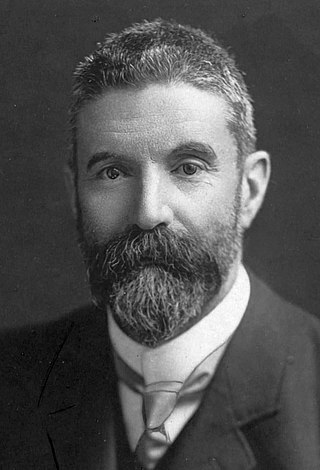
Several surveys of academics and the general public have been conducted to evaluate and rank the performance of the prime ministers of Australia.

In the run up to the general election on 7 May 2015, various organisations carried out opinion polling to gauge voting intention. Results of such polls are displayed in this article. Most of the polling companies listed are members of the British Polling Council (BPC) and abide by its disclosure rules.
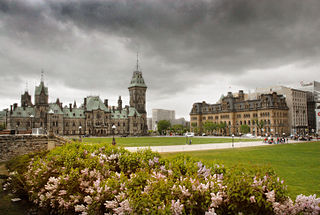
Surveys have been conducted to construct historical rankings of individuals who have served as prime minister of Canada. These ranking systems are usually based on surveys of academic historians, economists and political scientists. The rankings focus on the achievements, leadership qualities, failures and faults in office.
In the run-up to the general election on 8 June 2017, various organisations carried out opinion polling to gauge voting intentions. Results of such polls are displayed in this article. Most of the polling companies listed are members of the British Polling Council (BPC) and abide by its disclosure rules.

Winston Churchill was appointed First Lord of the Admiralty on 3 September 1939, the day that the United Kingdom declared war on Nazi Germany. He succeeded Neville Chamberlain as prime minister on 10 May 1940 and held the post until 26 July 1945. Out of office during the 1930s, Churchill had taken the lead in calling for British re-armament to counter the growing threat of militarism in Nazi Germany. As prime minister, he oversaw British involvement in the Allied war effort against the Axis powers. Regarded as the most important of the Allied leaders during the first half of the Second World War, Historians have long held Churchill in high regard as a victorious wartime leader who played an important role in defending Europe's liberal democracy against the spread of fascism. For his wartime leadership and for his efforts in overseeing the war effort, he has been consistently ranked both by scholars and the public as one of the top three greatest British prime ministers, often as the greatest prime minister in British history.

When Britain emerged victorious from the Second World War, the Labour Party under Clement Attlee came to power and created a comprehensive welfare state, with the establishment of the National Health Service giving free healthcare to all British citizens, and other reforms to benefits. The Bank of England, railways, heavy industry, and coal mining were all nationalised. The most controversial issue was nationalisation of steel, which was profitable, unlike the others. Economic recovery was slow, housing was in short supply, and bread was rationed along with many necessities in short supply. It was an "age of austerity". American loans and Marshall Plan grants kept the economy afloat. India, Pakistan, Burma, and Ceylon gained independence. Britain was a strong anti-Soviet factor in the Cold War and helped found NATO in 1949. Many historians describe this era as the "post-war consensus", emphasising how both the Labour and Conservative Parties until the 1970s tolerated or encouraged nationalisation, strong trade unions, heavy regulation, high taxes, and a generous welfare state.

The statue of Clement Attlee on the Mile End campus of Queen Mary University of London is a bronze sculpture of the British Prime Minister, created by Frank Forster in 1988. The statue was commissioned by the Greater London Council and was intended to stand in Mile End Park. By the time of its completion in 1988, the GLC had been abolished and the statue was offered to any successor authority willing to pay the relocation costs. These were met by Tower Hamlets London Borough Council and the statue was erected outside the Limehouse Public Library to commemorate Attlee's role as the member for the Limehouse parliamentary constituency. The opening ceremony was carried out by Harold Wilson, the last living member of Attlee's 1945-51 administration. By the 21st century, the statue had been badly vandalised and was boarded up. In 2010, Tower Hamlets Council offered the statue to Queen Mary University of London on permanent loan. It was re-erected on a site at the Mile End Road campus, next to the People's Palace where Attlee had attended the vote counting in the 1945 general election and learnt of the victory which brought in his peace-time government.



